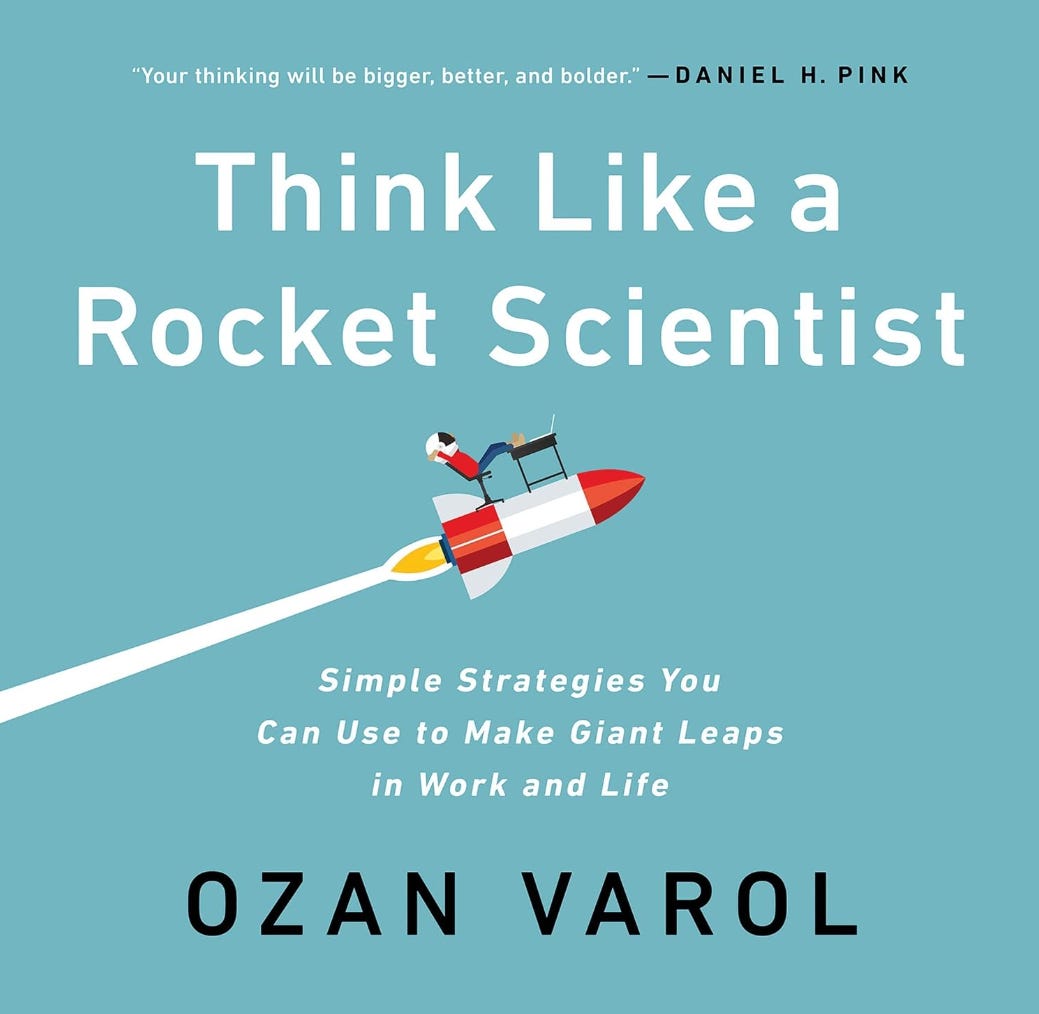Virtus 👊 #015: Burnt Sauces & Rocket Launches. Field Notes on Turning Failure Into Fuel.
How the Bitter Taste of Setbacks Can Fuel Your Next Breakthrough
This issue explores how success often comes from understanding and learning from our setbacks rather than avoiding them. Key insights include:
Field Notes from Failure: A consultant's story reveals how treating professional setbacks as data points rather than personal verdicts can transform our approach to growth.
Different Brilliance: Through William's journey as a multimedia artist, we discover how embracing our unique path often means letting go of traditional standards of success.
Think Like a Rocket Scientist: Ozan Varol's book shows us how treating uncertainty as a launch pad rather than an obstacle can lead to breakthrough innovations.
Innovation Science: New research from Northwestern University reveals why truly revolutionary ideas often face the strongest initial resistance.
Plus: Radiohead's "Weird Fishes/Arpeggi" demonstrates how diving into unknown waters can lead to unexpected breakthroughs.
Pour your coffee slowly. This one's for everyone who's ever wondered if their "failures" might actually be field notes for future success. Sometimes, the best data comes from the attempts that didn't work out as planned.
MAIN ARTICLE
Field Notes from Failure: When Loss Leads the Way
Photo by cottonbro studio
Brandon's screen flickers with the email he's read twenty times:
"We've decided to go with another consulting firm."
Six months of work. Countless meetings. A proposal he'd refined until every word felt perfect. All ending in a single paragraph of polite rejection.
His first thought comes fast and familiar: "Of course they picked someone else. You never belonged at this level anyway."
His inner critic doesn't whisper. It broadcasts.
I watch him from across our shared office space, expecting the usual aftermath of a lost client - the closed door, the intense focus on other work, the practiced professionalism that masks the wound.
Instead, he does something I've never seen. He pulls out a leather-bound notebook and starts writing.
"Looks important," I say.
"Most important notes I'll take all year." He glances up. "Want to know what my old chef used to tell me?"
This catches me off guard. I knew Brandon had worked in restaurants to pay for college, but he rarely talked about it.
"In culinary school, they teach you to taste your mistakes," he continues. "When a dish fails, your first instinct is to throw it out, start fresh, pretend it never happened. But a good chef? They sit with that failed dish. They taste it carefully. They find the story in the salt, the lessons in the burnt edges."
He turns his notebook so I can see the header: "Client Loss - Anderson Project - Initial Reactions"
Below it, two columns.
On the left: raw emotions.
On the right: objective observations.
Left: "Not good enough for this level"
Right: "Proposal possibly too complex - simplify next time"
Left: "They saw through me - knew I was faking it"
Right: "Need deeper research on client's industry - gaps showed"
Left: "Should never have tried for an account this size"
Right: "Scale-up strategy needs revision - build stronger mid-size portfolio"
"The left column," he explains, "that's the bitter taste. The ego's first reaction. I used to run from those thoughts. Now? They're ingredients telling me what needs work."
He points to the right column. "And this? This is the recipe getting better."
"Seems... organized," I offer.
"Has to be. Otherwise, the ego drowns out the evidence." He writes another line. "Every 'I'm not enough' is trying to show you exactly where you can grow. But first, you have to sit with the taste."
I think about my own recent failures - the proposals that didn't land, the clients who didn't renew. How quickly I'd moved on, calling it resilience when maybe it was just running.
"My chef had this saying," Brandon continues. "'A burned sauce tells a better story than a perfect one.' Know why? Because perfection doesn't teach. It's in the scorched spots, the too-salty bites, the collapsed souffles - that's where the real learning happens."
He closes his notebook. "But you have to be willing to taste it first. Really taste it. Even when it's bitter."
I notice he doesn't look defeated. Focused, yes. Thoughtful, certainly. But not beaten.
"The Anderson account," I venture, "will you try for something that size again?"
"Bigger," he says. "But differently. Better recipe now."
Here's what I learned watching Brandon that day:
True growth isn't about bouncing back fast. It's about sitting with the experience long enough to extract its lessons.
The ego's first reactions - the "not enough," the "who do you think you are," the "you never belonged here" - they're not verdicts. They're signposts pointing to where growth is possible.
Want to turn setbacks into strength?
Start here:
Catch the First Taste
Write down your immediate emotional reactions
Don't judge them - just document
Notice what stories your ego tells
Find the Ingredients
What specifically went wrong?
Where were the gaps?
What assumptions proved false?
Revise the Recipe
What needs to change?
Where can you grow?
What systems need updating?
Plan the Next Meal
Set concrete action steps
Build on what you learned
Aim higher, but differently
Two months later, Brandon landed an account twice the size of Anderson. Not because he's naturally resilient. Not because he "stayed positive." But because he learned to taste his mistakes, to find the lessons in the bitter moments.
Your setbacks are serving you something. The question is: Are you willing to sit at the table long enough to understand what it's trying to teach you?
Stop running from the taste of failure. Start developing your palate for progress.
Because the strongest growth doesn't come from getting it right the first time.
It comes from learning to find the lessons in every bitter bite.
SHORT STORY
Different Brilliance
Photo by Tima Miroshnichenko
William stood in the gallery, watching people walk past his installation – a wall of discarded phone screens displaying fragments of text messages, creating a mosaic of modern connection and disconnection. Not quite Michelangelo. Not even close. But uniquely his.
"It's... interesting," a visitor said, the pause carrying more meaning than the word.
Ten years ago, that pause would have crushed him. Now it made him smile.
He remembered his first year at art school, trying to perfect his figure drawing while classmates produced masterpieces of realism. His professor had found him in the studio at 3 AM, crumpling another failed attempt.
"You're fighting the wrong battle," she'd said, picking up his discarded sketches. "These aren't bad – they're different. But you're so busy looking at what they're not, you can't see what they are."
She'd spread his "failures" across the floor. While his classmates drew perfect hands, he'd drawn the spaces between fingers. While they captured exact facial features, he'd caught the tension in the air around expressions.
"Not everyone needs to be da Vinci," she'd said. "Some need to be Basquiat."
The next day, he'd stopped trying to draw perfect figures. Instead, he started experimenting with broken electronics, discarded screens, fragmented images. Found beauty in the glitch, meaning in the malfunction.
His first exhibition had been a disaster by traditional standards. Critics called it "amateur," "confused," "lacking technical skill."
Then a tech company CEO saw it. Two weeks later, William was installing his work in their headquarters – a wall of cracked smartphones displaying employee messages about hopes, fears, and dreams. The piece became a viral sensation, not for its technical perfection, but for its raw truth.
Now, watching people interact with his latest installation, he noticed something. They didn't just look – they shared. Took photos. Pointed out messages to each other. Connected.
A young artist approached him, sketchbook clutched tight. "I saw your TED talk. The one about finding your medium."
William nodded. He'd given that talk six months ago, titled "The Space Between Screens."
"I can't draw like the masters," the young man said. "But I can code. I've been trying to combine neural networks with watercolors and everyone says it's not real art..."
"What do you say it is?"
The young man blinked. "It's... mine."
"Then it's real enough."
William watched him walk away, standing a little straighter. He thought about all the years he'd spent trying to be something he wasn't, measuring himself against standards that were never meant for him.
His phone buzzed – another commission request. This time from a hospital. They wanted an installation about healing, connection, hope. Not beautiful in the classical sense, but true in the modern one.
He looked at his wall of broken screens, each one a "failure" of traditional art, together creating something entirely new. Each crack, each glitch, each imperfection adding to the story rather than detracting from it.
His professor had been right. Not everyone needs to be da Vinci.
Some need to be the ones who show us new ways to see.
Some need to be the ones who find beauty in the broken.
Some need to be themselves, brilliantly imperfect, perfectly unique.
William pulled out his notebook, already sketching ideas for the hospital installation. No perfect figures. No classical compositions. Just truth, told in broken screens and glitch art and all the ways technology fails to connect us – and somehow connects us anyway.
Not quite Michelangelo.
Not even close.
But exactly, perfectly William.
BOOK… A CALL
Think Like a Rocket Scientist
By Ozan Varol (amazon link - not an ad)
Look, most books about thinking differently read like they were written by someone who's never had to solve a real problem. Not this one.
Varol isn't selling you motivational fluff. He's sharing what he learned as an actual rocket scientist on NASA's Mars Exploration Rover mission. And surprisingly, it's not about being the smartest person in the room.
Why This Book Hits Different
Written by someone who had to get it right (Mars doesn't do second chances)
Uses real failures from space exploration to teach success principles
Zero motivational quotes, all practical strategies
Shows you how to think, not just what to think
Core Truth Bombs
Success doesn't come from avoiding failure but from failing productively
Uncertainty isn't your enemy - it's your launch pad
The questions you ask matter more than the answers you have
Most breakthroughs come from challenging assumptions everyone else accepts
Who Needs This
Guys stuck solving the same problems the same way
Men who want to innovate but feel boxed in by "best practices"
Anyone tired of finding out why things won't work
Leaders who need to think bigger without losing sight of details
Best Quote to Drop at Work
"The only difference between a breakthrough and a failure is what you do with the unexpected result."
The Real Talk
This isn't about becoming a genius. It's about approaching problems like scientists do - with curiosity instead of certainty. Varol shows you how to:
Turn uncertainties into opportunities
Use first principles thinking to solve impossible problems
Create backup plans that actually work
Learn from failure without getting stuck in it
Action Steps After Reading
List your assumptions about a current challenge
Question each one using first principles
Design small experiments to test your ideas
Document failures as data points, not defeats
Bottom Line
Want to solve bigger problems? Stop trying to be right and start trying to be less wrong. This book shows you how.
Remember: Rocket science isn't about being the smartest. It's about being the most methodical. This book teaches you the method.
MOO-SIC
"Weird Fishes/Arpeggi" - Radiohead
🎵 Listen on Spotify
Ever watch a band completely reinvent themselves? In 2007, Radiohead did exactly that with this track. They took everything they knew about making music and decided to build something entirely new.
Why This Track Hits Different
This isn't just a song - it's a masterclass in embracing the unknown. Radiohead could have kept making OK Computer over and over. Instead, they dove into weird waters and found something beautiful.
The Track Breakdown
Starts with a simple pattern that shouldn't work (but does)
Builds layers that seem random until they click
Creates order from chaos without losing the edge
Ends somewhere completely different from where it began
When to Hit Play
When you're stuck in old patterns
Before making a big decision
While working on something that feels "too different"
When you need to remember that weird can be wonderful
The Real Talk
Thom Yorke once said this track came from "being picked up by something and carried along." Sometimes innovation isn't about forcing change - it's about letting go of what you think something should be.
Pro Tip
First listen: Don't analyze. Just let it wash over you. Second listen: Notice how each "wrong" turn ends up exactly right. Third listen: That's when you'll get it.
Remember: Some of the best discoveries come from following the current instead of fighting it.
SCIENCE BEACH
Why We Miss Revolutionary Ideas: The Science of Innovation Blindness
Ever wonder why groundbreaking ideas often get rejected at first? Science just found out why, and it's not what you think.
A team at Northwestern University published a fascinating study in Nature Scientific Reports that reveals something wild about how we judge new ideas: The more innovative an idea is, the harder it is for us to recognize its value.
The Research Drop
Researchers analyzed 1,471 innovative ideas across multiple fields
They studied how people evaluate ideas of varying levels of novelty
The results? The more unusual an idea, the more likely it was to be dismissed
The Numbers Hit Different
Highly novel ideas were 23% less likely to be recognized as creative
Ideas that combined familiar elements in new ways scored better
The sweet spot? Ideas that were novel but not too far from existing concepts
Why This Matters
Think about it: Instagram was first dismissed as "just another photo app." The personal computer was seen as a "toy." The most revolutionary ideas often face the hardest road to acceptance.
The Practical Breakdown
The researchers found that our brains have a "novelty penalty" - we automatically discount things that are too different from what we know. It's not bias; it's biology.
Real World Impact
This explains why:
Revolutionary products often fail their first market tests
Breakthrough approaches get labeled as "too risky"
True innovators face more rejection early on
The Power Move
The study suggests three ways to overcome this bias:
Present new ideas by connecting them to familiar concepts
Break revolutionary changes into smaller, more digestible steps
Focus on the problem solved rather than the novelty of the solution
Source: Chan S., et al. (2023). "The costs of novelty: How unusual ideas are harder to see as creative." Nature Scientific Reports, 13, 14482.
Remember: Next time your unusual approach gets pushback, you're in good company. Science shows that's often the price of being ahead of the curve.
ABOUT MENQUILIBRIUM
Let's cut through the noise for a minute.
Who We Are
We're not life coaches. Not gurus. Not self-help prophets selling shortcuts to enlightenment.
We're just guys who got tired of seeing men struggle alone. We are those men.
What This Really Is
This newsletter isn't about fixing you. You're not broken.
It's not about turning you into something you're not. It's not about making you softer or harder or different.
It's about giving you space to be who you already are - without the masks, without the performance, without the BS.
The Catch (Because You're Wondering)
Yeah, we've got a paid subscription option. Yeah, we hope to build something bigger than just words on a screen.
But here's the real deal: This content, these stories, this brotherhood? It's free. Always will be.
Because we believe every man deserves access to:
Real talk without the hustle culture nonsense
Support without the toxic masculinity
Growth without the guru markup
What We're Not
We're not selling quick fixes
We're not pushing supplements or programs
We're not trying to recruit you into anything
We're not pretending to have all the answers
What We Are
We're building a space where:
Questions are better than answers
Growth happens at its own pace
Strength includes vulnerability
Brotherhood means showing up as you are
The Bottom Line
Every week, we remind each other:
Your path is yours
Your struggles are normal
Your efforts count
Your story matters
That's it. No hidden agenda. No secret handshake. No conspiracy.
Just men walking together, growing together, figuring shit out together.
🤜🤛
Remember: In a world full of people trying to sell you something, sometimes the most radical thing is just being real.





